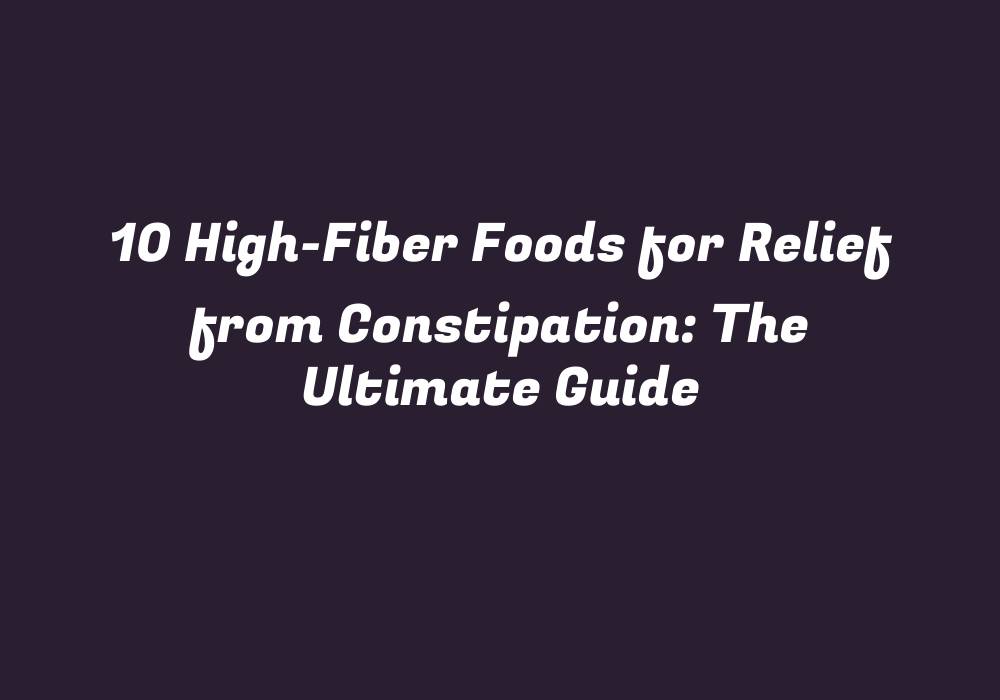10 High-Fiber Foods for Relief from Constipation: The Ultimate Guide
Introduction
Constipation, a common issue, can greatly impact an individual’s daily life. It is characterized by infrequent or difficult bowel movements and could be due to various reasons including poor diet, dehydration, sedentary lifestyle, and certain medical conditions. Consuming high-fiber foods plays a vital role in managing constipation by providing essential nutrients that support the digestive system. In this article, we will explore ten high-fiber foods that can help provide relief from constipation and contribute to better overall health.
1. Whole Grains
Whole grains are a rich source of dietary fiber that is beneficial for digestion and preventing constipation. These include brown rice, whole-wheat pasta, quinoa, barley, oats, and bulgur. They provide various health benefits by promoting bowel regularity, controlling blood sugar levels, and lowering cholesterol. Incorporating whole grains into your daily meals can help improve your gut health and alleviate constipation issues.
2. Beans, Legumes, and Lentils
Beans, legumes, and lentils are excellent sources of dietary fiber, essential nutrients, and antioxidants. These foods contain both soluble and insoluble fibers that can help regulate bowel movements by absorbing water and softening stools. Incorporating different varieties like kidney beans, chickpeas, black beans, lentils, and peas into your diet can provide a range of health benefits beyond constipation relief.
3. Fruits
Fruits contain significant amounts of fiber, vitamins, and minerals that are essential for overall health. Some examples of high-fiber fruits include apples, pears, berries (e.g., raspberries, blueberries), bananas, and oranges. These fruits also provide soluble fiber that can help promote a healthy digestive system and prevent constipation by absorbing excess cholesterol. Adding more fruit to your daily meals can contribute to better bowel movement frequency.
4. Vegetables
Vegetables are an integral part of a balanced diet due to their fiber content and various health benefits. Examples include spinach, broccoli, cabbage, brussels sprouts, asparagus, artichokes, and carrots. These vegetables provide both soluble and insoluble fibers that contribute to optimal digestion and help alleviate constipation by promoting smooth bowel movements. Consuming a variety of vegetables can significantly improve overall health.
5. Nuts and Seeds
Nuts and seeds are excellent sources of dietary fiber and healthy fats, which play an essential role in preventing constipation by promoting bowel regularity. Almonds, walnuts, chia seeds, flaxseeds, pumpkin seeds, and sunflower seeds offer various health benefits such as improved heart health, blood sugar control, and weight management. Incorporating these nutritious snacks into your daily routine can help improve gut health and ease constipation issues.
6. Dark Chocolate
Dark chocolate is a delightful treat that provides a good dose of fiber, antioxidants, and minerals like magnesium, which contribute to better bowel movement frequency. It has been found to have prebiotic properties, encouraging the growth of beneficial gut bacteria and promoting digestive health. Opt for dark chocolate with at least 70% cocoa solids to reap its numerous health benefits without excessive sugar intake.
7. Psyllium Husks
Psyllium husks are a natural source of fiber that is commonly used for treating constipation. Made from the outer covering of the plantago ovata seed, they can be mixed with water to form a gel-like substance that absorbs excess water in the digestive system and adds bulk to stools. This promotes bowel regularity and alleviates constipation issues. However, it is essential to consume psyllium husks cautiously as overuse may lead to bloating or gas.
8. Ground Flaxseeds
Ground flaxseeds are an excellent source of dietary fiber and omega-3 fatty acids that can help alleviate constipation by promoting bowel regularity. Adding a tablespoon or two of ground flaxseeds to your oatmeal, smoothies, or yogurt can provide substantial amounts of soluble and insoluble fibers, which help regulate bowel movements. It’s important to note that whole flaxseeds should be consumed in moderation as they can pass through the digestive system without providing full benefits.
9. Chia Seeds
Chia seeds are rich sources of fiber, omega-3 fatty acids, and various essential minerals that contribute to better gut health and overall wellbeing. Adding a tablespoon or two of chia seeds to your smoothies, yogurt, oatmeal, or salads can provide soluble and insoluble fibers that promote regular bowel movements and prevent constipation. These tiny seeds also offer numerous benefits such as improved heart health and better blood sugar control.
10. Oat Bran
Oat bran, the outer layer of oats, is a rich source of soluble fiber that can help regulate bowel movements by softening stools and preventing constipation. Consuming oat bran in your daily meals can provide essential nutrients like vitamins B1 and E, calcium, magnesium, and iron that contribute to overall health. Mixing oat bran into your breakfast cereal or incorporating it into baked goods can offer numerous health benefits without significant caloric intake.
In conclusion, including high-fiber foods in your diet is essential for maintaining optimal digestive health and preventing constipation issues. By consuming a variety of fiber-rich foods such as whole grains, beans, legumes, vegetables, fruits, nuts, seeds, chocolate, psyllium husks, ground flaxseeds, chia seeds, and oat bran, you can contribute to better overall health and enjoy relief from constipation. Always remember to drink adequate amounts of water and maintain an active lifestyle for optimal digestive function.
